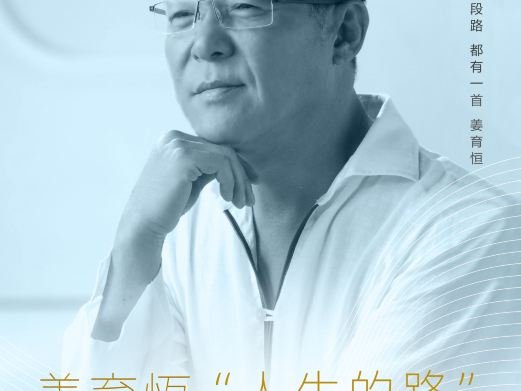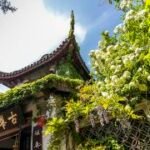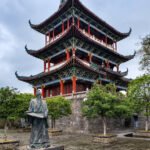Located approximately 6 kilometers west of She County, the Tangyue Memorial Archway Group consists of seven archways, each spanning the stone-paved rural roads one after another, creating an extraordinary presence. Every April, the rapeseed flowers blooming on both sides of the road enhance the charm of the archways. Not far from the archways lies the Baojia Garden, where one can admire numerous bonsai. The seven archways of the Tangyue group are centered around the ‘Yi’ archway, arranged in the order of loyalty, filial piety, chastity, and righteousness from both ends to the center. The Bao Can Filial Piety Archway, the Cixiaoli Archway, and the Bao Xiangxian Ministerial Archway are from the Ming Dynasty, while the Bao Wenling’s Wife Jiang’s Chastity and Filial Piety Archway, the Le Shan Hao Shi Archway, Bao Wenyuan’s Successive Wife Wu’s Chastity and Filial Piety Archway, and Bao Fengchang’s Filial Son Archway are from the Qing Dynasty. Archways were established in ancient times to honor individuals with distinguished merits and virtues, making each one a rare and moving story. Do not miss these three archways: Bao Xiangxian Ministerial Archway, Cixiaoli Archway, and Bao Wenyuan’s Successive Wife Wu’s Chastity and Filial Piety Archway. The Bao Xiangxian Ministerial Archway was originally built during the Tianqi era of the Ming Dynasty, as Bao Xiangxian was rewarded for his border defense merits by the emperor, which also led to the establishment of his grandfather Bao Can’s Filial Piety Archway. The Cixiaoli Archway from the Ming Dynasty was built to honor a father’s kindness and a son’s filial piety. At that time, a father and son from the Bao family were captured by rebels, and when one had to be executed, both were willing to die for the other’s survival, a deeply moving story. The Bao Wenyuan’s Successive Wife Wu’s Chastity and Filial Piety Archway, built during the Qianlong era of the Qing Dynasty, was erected in memory of a Shanghai woman who began to live as a widow at the age of 29. Next to the archway group, there are two ancestral halls. In Tangyue Village, the Bao surname is the most prominent, and these halls enshrine the Bao family. The Dunben Hall, also known as the Bao Family Branch Ancestral Hall, commonly referred to as the Men’s Ancestral Hall, is grand in scale, with inscriptions such as the Yitian Regulations Stele and the Jiaqing Emperor’s Edict Stele. The Qingyitang, also known as the Bao Family Women’s Ancestral Hall, is very special, built exclusively for the chaste and valiant women of the Bao family throughout the generations. The history of Huizhou men being away on business for long periods, leaving Huizhou women to live alone until old age, can be faintly seen through these ancestral halls. Baojia Garden is just 500 meters away from the Tangyue Archway Group, and it is a must-visit after visiting the archway group. In this private garden from the Qing Dynasty, one can find well-pruned bonsai, including the ‘Southland Charm’ ancient banyan tree, which has been cultivated for over two hundred years and is the ‘treasure of the garden’.

Full text? The opening hours are all year round from 07:30 to 17:30, with specific business conditions subject to the day’s opening status.






